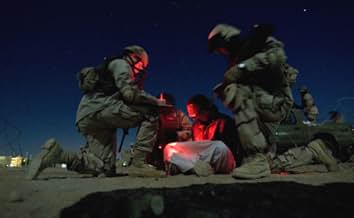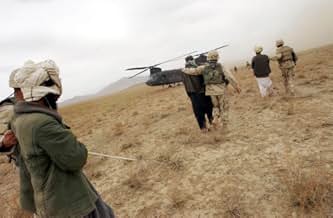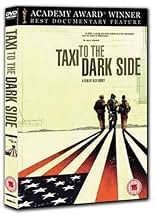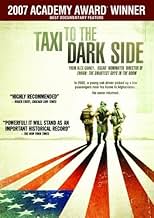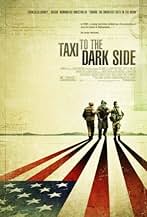VALUTAZIONE IMDb
7,5/10
17.310
LA TUA VALUTAZIONE
Aggiungi una trama nella tua linguaAlex Gibney exposes the haunting details of the USA's torture and interrogation practices during the War in Afghanistan.Alex Gibney exposes the haunting details of the USA's torture and interrogation practices during the War in Afghanistan.Alex Gibney exposes the haunting details of the USA's torture and interrogation practices during the War in Afghanistan.
- Regia
- Sceneggiatura
- Star
- Vincitore di 1 Oscar
- 10 vittorie e 5 candidature totali
Alex Gibney
- Narrator
- (voce)
Moazzam Begg
- Self - Torture Victim
- (as Moazzam Beg)
George W. Bush
- Self
- (filmato d'archivio)
Jack Cafferty
- Self
- (filmato d'archivio)
Dick Cheney
- Self
- (filmato d'archivio)
Lynndie England
- Self
- (filmato d'archivio)
Tommy Franks
- Self - General
- (filmato d'archivio)
Recensioni in evidenza
With a title like Taxi to the Dark Side, you know it's not going to be a light-and-fluffy film, but it's a film that needed to be made, and should be seen by everyone.
The measure of a nation is how well it lives up to its ideals in the worst of times. 9/11 was that trial for America, and America failed. If you do not believe that former U.S. president George W. Bush, former vice president Dick Cheney, Secretary of Defense Donald Rumsfeld, White House Council John Yoo, and at least a half dozen other members of the Bush Administration are guilty of war crimes, you must see this documentary.
Even if you suspect they do, but have lingering doubts – you must see this documentary.
And especially if you don't know either way, and know nothing about this issue – you must see this documentary.
This is not some sort of Michael Moore propaganda piece. This transcends partisan politics. It deals with a broader issue. It focuses on the treatment of just one detainee and will probably make you sick to your stomach – if you can stomach it at all. And then reminds you that this happened not to just one guy, but to 83,000 others too.
Hell yes, its difficult to watch - there is graphic photos of torture – but is that an excuse not to watch it? The fact is they are presented because showing them is necessary to fully understand the extent of what went on. And guess what? If you are an American, you damn well should sit through this, because you are guilty too – this is what your elected officials did.
Of course when word finally got out, and they got blowback for it, in an outrageous act of cowardice, they left their own subordinates out to dry.
The film makes the case, clearly, efficiently and thoroughly. Which makes it not only an excellent documentary, but an important one too.
The measure of a nation is how well it lives up to its ideals in the worst of times. 9/11 was that trial for America, and America failed. If you do not believe that former U.S. president George W. Bush, former vice president Dick Cheney, Secretary of Defense Donald Rumsfeld, White House Council John Yoo, and at least a half dozen other members of the Bush Administration are guilty of war crimes, you must see this documentary.
Even if you suspect they do, but have lingering doubts – you must see this documentary.
And especially if you don't know either way, and know nothing about this issue – you must see this documentary.
This is not some sort of Michael Moore propaganda piece. This transcends partisan politics. It deals with a broader issue. It focuses on the treatment of just one detainee and will probably make you sick to your stomach – if you can stomach it at all. And then reminds you that this happened not to just one guy, but to 83,000 others too.
Hell yes, its difficult to watch - there is graphic photos of torture – but is that an excuse not to watch it? The fact is they are presented because showing them is necessary to fully understand the extent of what went on. And guess what? If you are an American, you damn well should sit through this, because you are guilty too – this is what your elected officials did.
Of course when word finally got out, and they got blowback for it, in an outrageous act of cowardice, they left their own subordinates out to dry.
The film makes the case, clearly, efficiently and thoroughly. Which makes it not only an excellent documentary, but an important one too.
Taxi to the Dark Side accomplishes what a documentary, or just a concise analysis, regarding all of the facts in one of the many nightmares the United States' involvement in the middle east should: to inspire the utmost disgust and condemnation of a system that has become as corrupt as it has (or rather always has been with this bunch). It's uncontainable to think how all of this started, grew exponentially, and resulted ultimately in the horrors at Abu Gharyb and Guantanamo Bay, in that it is nestled in the twisted, criminal (yes folks, criminal) 'policies' of the Bush administration. But Alex Gibney's approach isn't narrow-minded but multi-faceted: he's interested in what a complex, ugly organism torture has become, the psychological just as much as the physical, and he has a man at the center of it. Dilawar, an innocent taxi driver from a poor farm in Afghanistan, was swept up by three other Afghan soldiers and sent to Bagram prison, where along with other supposed terrorists or terrorist collaborators was tortured (in his case especially in brutal fashion, as we learn in graphic description from those who participated first-hand), and died from the trauma.
His death was a controversy, but not one that ever got the kind of attention it deserved; until this documentary I never even heard of Dilawar or even much about Bagram prison. Yet it was at this prison, as well as the first biggie interrogation of the would-be 20th hijacker of the plane on 9/11 to crash in Pennsylvania (which, by false confession, led to an over-excited but false-rooted assumption that Al Quaeda had links to Baghdad), that led to Abu Gharyb, which revealed the horrors of soldiers in unyielding terror over their subjects but, more importantly, the virus that spread through the chain of command. Gibney's approach is approximate and expertly probing: it's not enough to just focus of Dilawar (even as his story could make up a whole legitimate documentary alone), or on Abu Gharyb. As in his previous film, Enron: The Smartest Guys in the Room, it's essential to dissect this wretched beast from top to bottom, to see not simply the soldiers first-hand accounts, but straight from the horse's mouth the words from Cheney, Rumsfeld, Powell, and Bush himself.
Because, in reality, there is something to feel sorry for with these soldiers. It can be argued, and not without just cause, that what the soldiers did at Bagram, Abu Gharyb, and to an extent even at GITMO, was wrong and rotten and they could have said no and so on and so forth. However, as with the ground war situation in Iraq, it's all about the chain of command, and the fact that no matter what the parties initially responsible are not held accountable for any of their actions. It's almost frightening to forget the amount of footage available with these men like Rumsfeld and Gonzalez and Cheney where they not only admit to being fine with torture tactics - and whether or not it's psychological torture or not is besides the point as ALL torture IS torture, albeit a facet that Gibney brilliantly chronicles in the history of the CIA to its 'logical' extension in recent years - but set it up in legal wrangling so as to not get it any trouble for what they've done which is, of course, breaking Geneva conventions and whatnot.
If I sound like I'm sounding bias with this, then you should leave this review right now. There is no bias when it comes to this issue (or rather there SHOULD be no bias, as for a split second McCain showed until he relented recently that torture isn't as bad as he used to think). What one sees as the line between what is proper interrogation of a subject and outright abuse to get that "ticking time-bomb" is revealed by Kloogman from the FBI, who paraphrases how an interrogation would usually be done and lays it on the line that this form has actually had results - not pain and death or, at best, a bull**** court at GITMO where it's like a joke Kafka wouldn't write. Gibney presents all the information with the bluntness that's required, with testimony, footage from press conferences and commissions (i.e. that cringe-inducing bit with Gonzalez where he has a horrible pause when trying to answer a simple question about whether or not to condone torture), and it's presented lucidly, edited for a cumulative effect and with the skill of a filmmaker in total trust with his subject(s) to take all of the pieces into a whole that shakes one to the core.
And all of this would be powerful enough to make an impact, but with the recent explosion of news coverage on water-boarding - and that the CIA has admitted to torturing three subjects - Taxi to the Dark Side remains startlingly relevant. In fact, it's even more tragically relevant than last year's Sicko or even No End in Sight. From the tragedy of Dilawar to the tragedy of Abu Gharyb, which was like Salo turned into as shockingly real as could never be imaginable, the Bush administration has put the US into even more danger than ever before by resorting to the lowest form of humanity, condoning acts to the soldiers that sixty years ago would never be committed in the harshest of circumstances on our side. This, again, isn't some silly bias, this is just fact. It's enough to make one sick to one's stomach, and as long as a film such as this exists, the pain can't be brushed aside or dulled by diverting network news.
His death was a controversy, but not one that ever got the kind of attention it deserved; until this documentary I never even heard of Dilawar or even much about Bagram prison. Yet it was at this prison, as well as the first biggie interrogation of the would-be 20th hijacker of the plane on 9/11 to crash in Pennsylvania (which, by false confession, led to an over-excited but false-rooted assumption that Al Quaeda had links to Baghdad), that led to Abu Gharyb, which revealed the horrors of soldiers in unyielding terror over their subjects but, more importantly, the virus that spread through the chain of command. Gibney's approach is approximate and expertly probing: it's not enough to just focus of Dilawar (even as his story could make up a whole legitimate documentary alone), or on Abu Gharyb. As in his previous film, Enron: The Smartest Guys in the Room, it's essential to dissect this wretched beast from top to bottom, to see not simply the soldiers first-hand accounts, but straight from the horse's mouth the words from Cheney, Rumsfeld, Powell, and Bush himself.
Because, in reality, there is something to feel sorry for with these soldiers. It can be argued, and not without just cause, that what the soldiers did at Bagram, Abu Gharyb, and to an extent even at GITMO, was wrong and rotten and they could have said no and so on and so forth. However, as with the ground war situation in Iraq, it's all about the chain of command, and the fact that no matter what the parties initially responsible are not held accountable for any of their actions. It's almost frightening to forget the amount of footage available with these men like Rumsfeld and Gonzalez and Cheney where they not only admit to being fine with torture tactics - and whether or not it's psychological torture or not is besides the point as ALL torture IS torture, albeit a facet that Gibney brilliantly chronicles in the history of the CIA to its 'logical' extension in recent years - but set it up in legal wrangling so as to not get it any trouble for what they've done which is, of course, breaking Geneva conventions and whatnot.
If I sound like I'm sounding bias with this, then you should leave this review right now. There is no bias when it comes to this issue (or rather there SHOULD be no bias, as for a split second McCain showed until he relented recently that torture isn't as bad as he used to think). What one sees as the line between what is proper interrogation of a subject and outright abuse to get that "ticking time-bomb" is revealed by Kloogman from the FBI, who paraphrases how an interrogation would usually be done and lays it on the line that this form has actually had results - not pain and death or, at best, a bull**** court at GITMO where it's like a joke Kafka wouldn't write. Gibney presents all the information with the bluntness that's required, with testimony, footage from press conferences and commissions (i.e. that cringe-inducing bit with Gonzalez where he has a horrible pause when trying to answer a simple question about whether or not to condone torture), and it's presented lucidly, edited for a cumulative effect and with the skill of a filmmaker in total trust with his subject(s) to take all of the pieces into a whole that shakes one to the core.
And all of this would be powerful enough to make an impact, but with the recent explosion of news coverage on water-boarding - and that the CIA has admitted to torturing three subjects - Taxi to the Dark Side remains startlingly relevant. In fact, it's even more tragically relevant than last year's Sicko or even No End in Sight. From the tragedy of Dilawar to the tragedy of Abu Gharyb, which was like Salo turned into as shockingly real as could never be imaginable, the Bush administration has put the US into even more danger than ever before by resorting to the lowest form of humanity, condoning acts to the soldiers that sixty years ago would never be committed in the harshest of circumstances on our side. This, again, isn't some silly bias, this is just fact. It's enough to make one sick to one's stomach, and as long as a film such as this exists, the pain can't be brushed aside or dulled by diverting network news.
Taxi to the Dark Side doesn't contain anything wholly new, just more complete detail and important clarifications, such as the fact that Guantanamo uses very much the same basic methods to Abu Ghraib, though the location is cleaner and of course was not formerly used by Saddam Hussein. Dilawar, the Afghan taxi driver, was essentially beaten to death by American soldiers in the Bagram prison. He did not live long once his ill-trained but plainly-directed captors got hold of him, but his final hours were terrifying and horrible. They kicked his legs till they turned to pulp and would have had to be amputated, had he lived. A heart condition caused an embolism that went to his brain and was the cause of death, which on the official US papers given to Dilawar's family, in English so they did not know what they meant, was "homicide," but the officer in charge of the prison denied this when queried. Gibney, who was responsible previously for the documentary Enron: The Smartest Guys in the Room, presents interviews with some of the American soldiers responsible for Dilawar's death. They were, of course, only following orders. Other talking heads clarify the fact that the "gloves are off" policy by US authorities following 9/11/01 goes back to Cheney, approved by Bush, carried out with gusto by Rumsfeld, and sent directly down the line to the low-ranking and inexperienced people whose behavior after the Abu Ghraib scandal emerged was claimed by authorities to be that of people on the "night shift" or "a few bad apples." This film thoroughly disproves that claim.
Gibney shows how the US administration has become willing to blatantly disregard the rule of law, domestic as well as international, to fight their "war on terror" in ways that involved extreme cruelty and murder. In doing this they had the assistance of various corrupt or immoral--or, if you prefer, simply very misguided--men of the law and the judiciary.
The practices have been illegal. They may also have been variously unwise. The photos of Americans mistreating Muslim prisoners at Abu Ghraib are good recruiting material for anti-US terrorists. But torture also simply doesn't work, accomplishes nothing useful. Much time is given to Alfred McCoy, author of a book called 'The Question of Torture' and a professor of history at the University of Wisconsin. McCoy recounts that the CIA has been working on methods of coercion for all the decades of its existence, but their experiments have yielded little except lawsuits from victimized guinea pigs. Another authority, a former CIA operative, asserts that the best method to obtain information is to gain the confidence of the prisoner and convince him you can help him.
But post 9/11 "high value" prisoners were clearly tortured with anything their captors could think of--and then confessed to anything they could think of. The film clarifies that psychological experiments by Donald Hobb at McGill University in the Seventies proved sensory deprivation is the most effective means of torture; at least according to Hobb it can induce psychosis within 48 hours. The film shows that basically all "terrorism" suspects here and abroad have been subjected to sensory deprivation. That is what covering the ears, head, and hands does; and it was and is standard treatment to continue this for hours and days. This is more effective than pain. But effective at doing what? Breaking down the prisoner, not obtaining reliable information, or any information, for that matter.
Hence the widely spread US policies are not only harmful, dangerous, immoral, and illegal, but stupid and, in intelligence-gathering terms, worthless.
The "extraordinary rendition," waterboarding, sensory deprivation, etc. don't work in practical terms, but they have a political purpose. They convince people that the US is "getting tough" on its enemies. But the US has not been holding real enemies. If it were, the useless prisoners or wrongly captured would be filtered out, as Dilawar ought to have been. He was innocent. And now the US authorities are in a bad position. They cannot acquit even those few Guantanamo prisoners they are putting up for show trials, because to do so would reveal that they had been held for six years for no reason. That would look bad. Varieties of Orwellian terminology have been devised to describe these prisoners. The film also shows "tours" of Guantanamo and deflates the claims of the tour guides.
One reason for all this is who's been in charge: a group of draft dodgers who never served in a war. Senator McCain is shown in the film as a man who opposes torture for good reason: because he experienced it during his years in a North Vietnam prison.
Another issue: American has a developed a culture of guilty-as-charged, of hysterical attacks on imagined enemies. An example: the popular jingoistic TV program "24," starring Kiefer Sutherland as a CIA agent who "saves" millions by torturing mad terrorists with ticking bombs in Times Square. A Dark Side talking head says that there has never been such a person captured, and suggests that if there were, such a person would have the commitment to die rather than reveal information about his plot.
I do not know if torture never gets you information, though the assertion that insinuating oneself into the confidence of a prisoner is more effective makes sense. What is clear enough from Gibney's powerful and disturbing film (which contains many images not for the squeamish) is that the torture and wrongful imprisonment and lawlessness of the US as a nation post-9/11 indicate a country that has become very cruel and very stupid.
Andrew O'Hehir of Salon.com recounts that at a post-screening Q&A when Gibney was asked what he would like his film to accomplish, he said "I hope it provokes some rage." "Well," says O'Hehir, "it worked on me." May it work on everyone who sees it.
Gibney shows how the US administration has become willing to blatantly disregard the rule of law, domestic as well as international, to fight their "war on terror" in ways that involved extreme cruelty and murder. In doing this they had the assistance of various corrupt or immoral--or, if you prefer, simply very misguided--men of the law and the judiciary.
The practices have been illegal. They may also have been variously unwise. The photos of Americans mistreating Muslim prisoners at Abu Ghraib are good recruiting material for anti-US terrorists. But torture also simply doesn't work, accomplishes nothing useful. Much time is given to Alfred McCoy, author of a book called 'The Question of Torture' and a professor of history at the University of Wisconsin. McCoy recounts that the CIA has been working on methods of coercion for all the decades of its existence, but their experiments have yielded little except lawsuits from victimized guinea pigs. Another authority, a former CIA operative, asserts that the best method to obtain information is to gain the confidence of the prisoner and convince him you can help him.
But post 9/11 "high value" prisoners were clearly tortured with anything their captors could think of--and then confessed to anything they could think of. The film clarifies that psychological experiments by Donald Hobb at McGill University in the Seventies proved sensory deprivation is the most effective means of torture; at least according to Hobb it can induce psychosis within 48 hours. The film shows that basically all "terrorism" suspects here and abroad have been subjected to sensory deprivation. That is what covering the ears, head, and hands does; and it was and is standard treatment to continue this for hours and days. This is more effective than pain. But effective at doing what? Breaking down the prisoner, not obtaining reliable information, or any information, for that matter.
Hence the widely spread US policies are not only harmful, dangerous, immoral, and illegal, but stupid and, in intelligence-gathering terms, worthless.
The "extraordinary rendition," waterboarding, sensory deprivation, etc. don't work in practical terms, but they have a political purpose. They convince people that the US is "getting tough" on its enemies. But the US has not been holding real enemies. If it were, the useless prisoners or wrongly captured would be filtered out, as Dilawar ought to have been. He was innocent. And now the US authorities are in a bad position. They cannot acquit even those few Guantanamo prisoners they are putting up for show trials, because to do so would reveal that they had been held for six years for no reason. That would look bad. Varieties of Orwellian terminology have been devised to describe these prisoners. The film also shows "tours" of Guantanamo and deflates the claims of the tour guides.
One reason for all this is who's been in charge: a group of draft dodgers who never served in a war. Senator McCain is shown in the film as a man who opposes torture for good reason: because he experienced it during his years in a North Vietnam prison.
Another issue: American has a developed a culture of guilty-as-charged, of hysterical attacks on imagined enemies. An example: the popular jingoistic TV program "24," starring Kiefer Sutherland as a CIA agent who "saves" millions by torturing mad terrorists with ticking bombs in Times Square. A Dark Side talking head says that there has never been such a person captured, and suggests that if there were, such a person would have the commitment to die rather than reveal information about his plot.
I do not know if torture never gets you information, though the assertion that insinuating oneself into the confidence of a prisoner is more effective makes sense. What is clear enough from Gibney's powerful and disturbing film (which contains many images not for the squeamish) is that the torture and wrongful imprisonment and lawlessness of the US as a nation post-9/11 indicate a country that has become very cruel and very stupid.
Andrew O'Hehir of Salon.com recounts that at a post-screening Q&A when Gibney was asked what he would like his film to accomplish, he said "I hope it provokes some rage." "Well," says O'Hehir, "it worked on me." May it work on everyone who sees it.
Too few have heard of Dilawar. Those who have will probably never forget him. Alex Gibney certainly will not. His latest film starts and ends with this poor innocent taxi driver who, in 2002, was taken to the Bagram airbase in Afghanistan. Five days later, he was dead.
Dilawar's death was the spark which ultimately led to the international awareness of what the Bush administration was doing to its detainees in the war on terror. Gibney's film, however, decides to look up the tree, not down, to discover who was really responsible for these unpleasant developments.
Gibney's film is bolstered by frank and interesting interviews with some of the troops on the ground. Their remorse is clear, as is their disgust. And disgust is the right word. This is, by no means, an easy watch. The use of the appalling footage which has been generated by the recent conflicts is necessary because, if anyone is in any doubt about how morally reprehensible these tactics are, this film will make it abundantly clear.
However, this film's real strength is the structure of its attack on the tactics that are employed. Gibney demonstrates that the tactics used are hopelessly inadequate and never yield effective information. There is a cutting and brilliant comparison with the old techniques and the new where an interviewee, a former FBI interrogator, uses his old tools of interrogation words and you can feel yourself being persuaded.
This is not just a polemic. It is a human story and a powerful and well-constructed argument. It should be essential viewing as what has happened at Guantanamo, Bagram and Abu Ghraib should never be forgotten. This is excellent, important film-making.
4 Stars out of 5
Dilawar's death was the spark which ultimately led to the international awareness of what the Bush administration was doing to its detainees in the war on terror. Gibney's film, however, decides to look up the tree, not down, to discover who was really responsible for these unpleasant developments.
Gibney's film is bolstered by frank and interesting interviews with some of the troops on the ground. Their remorse is clear, as is their disgust. And disgust is the right word. This is, by no means, an easy watch. The use of the appalling footage which has been generated by the recent conflicts is necessary because, if anyone is in any doubt about how morally reprehensible these tactics are, this film will make it abundantly clear.
However, this film's real strength is the structure of its attack on the tactics that are employed. Gibney demonstrates that the tactics used are hopelessly inadequate and never yield effective information. There is a cutting and brilliant comparison with the old techniques and the new where an interviewee, a former FBI interrogator, uses his old tools of interrogation words and you can feel yourself being persuaded.
This is not just a polemic. It is a human story and a powerful and well-constructed argument. It should be essential viewing as what has happened at Guantanamo, Bagram and Abu Ghraib should never be forgotten. This is excellent, important film-making.
4 Stars out of 5
This horrifying documentary won the Oscar for 2007. Using the case of an innocent Afghan taxi driver who were tortured to death by American interrogators in Bagram prison as the starting point, the film chronicles the atrocities committed by the Bush administration in the name of American people and an ill-defined 'war on terror'.
The film is written, directed and narrated by Alex Gibney, son of a high-ranking naval officer who was an interrogator in World War II. A great American and a true patriot, Frank Gibney's final disappointment of what became of the great nation of the United States in the hands of a few liars is heart-wrenching.
There is not a single frame in the film that is not supported by hard evidence. All of the investigation was conducted by Americans whose credentials of decency and patriotism are above suspicion. The film is a chronicle of how paranoia, self-serving deceit and mere stupidity can threaten the very values a great nation was built on. It should be impossible for anyone who watches this meticulous document to ever criticize the veracity of claims put forward by the recent films, Rendition, In the Valley of Elah, or Redacted - flawed as films though that they were.
Every person in the world, especially every American, that cares about the true nature of freedom and the sanctity of the individual (the basic tenets on which America was built) should see this film. How could anyone claim that it would be loved only by the supporters of Taliban is beyond me.
The film is written, directed and narrated by Alex Gibney, son of a high-ranking naval officer who was an interrogator in World War II. A great American and a true patriot, Frank Gibney's final disappointment of what became of the great nation of the United States in the hands of a few liars is heart-wrenching.
There is not a single frame in the film that is not supported by hard evidence. All of the investigation was conducted by Americans whose credentials of decency and patriotism are above suspicion. The film is a chronicle of how paranoia, self-serving deceit and mere stupidity can threaten the very values a great nation was built on. It should be impossible for anyone who watches this meticulous document to ever criticize the veracity of claims put forward by the recent films, Rendition, In the Valley of Elah, or Redacted - flawed as films though that they were.
Every person in the world, especially every American, that cares about the true nature of freedom and the sanctity of the individual (the basic tenets on which America was built) should see this film. How could anyone claim that it would be loved only by the supporters of Taliban is beyond me.
Lo sapevi?
- Citazioni
Damien Corsetti - Military Interrogator: You put people into a crazy situation, people will do crazy things.
- Colonne sonoreIn My Little Corner of the World
Words by Bob Hilliard Music by Lee Pockriss
Published by Better Half Music (Division of Bourne Co.)
and Emily Music Corporation
Performed by Yo La Tengo
Courtesy of Matador Records
I più visti
Accedi per valutare e creare un elenco di titoli salvati per ottenere consigli personalizzati
- How long is Taxi to the Dark Side?Powered by Alexa
Dettagli
Botteghino
- Budget
- 1.000.000 USD (previsto)
- Lordo Stati Uniti e Canada
- 274.661 USD
- Fine settimana di apertura Stati Uniti e Canada
- 10.930 USD
- 20 gen 2008
- Lordo in tutto il mondo
- 294.309 USD
- Tempo di esecuzione
- 1h 46min(106 min)
- Colore
- Mix di suoni
- Proporzioni
- 1.85 : 1
Contribuisci a questa pagina
Suggerisci una modifica o aggiungi i contenuti mancanti






